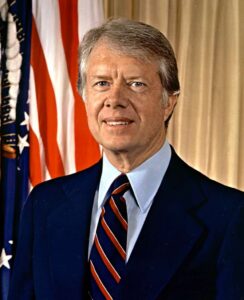In Memory of President Jimmy Carter: A Legacy of Peace and Compassion

James Earl “Jimmy” Carter Jr., the 39th President of the United States, passed away peacefully at the age of 100. Known for his unwavering commitment to human rights, diplomacy, and community service, Carter’s life and career have left an indelible mark on American history and the world.
Born on October 1, 1924, in Plains, Georgia, Jimmy Carter grew up in a modest farming community. His upbringing instilled in him a deep sense of responsibility, hard work, and compassion for others. After graduating from the United States Naval Academy in 1946, Carter served as a naval officer, where he developed his skills in leadership and diplomacy.
In 1962, Carter entered politics, serving in the Georgia State Senate. His dedication to integrity and transparency quickly set him apart. In 1971, he was elected Governor of Georgia, where he focused on reforming the state’s education system and promoting civil rights. Carter’s commitment to racial equality was evident as he championed desegregation and appointed more African Americans to government positions than any of his predecessors.
Carter’s rise to national prominence came in 1976 when he won the Democratic nomination for President. Running as a Washington outsider, he promised to restore honesty and integrity to the White House. His message resonated with the American public, and he won the election, becoming the 39th President of the United States.
As President, Carter faced significant challenges, including a struggling economy and a fractured international landscape. Despite these hurdles, he achieved notable successes. One of his most significant accomplishments was the Camp David Accords, a peace agreement between Egypt and Israel. This historic treaty, brokered by Carter, helped to stabilize the Middle East and earned him the Nobel Peace Prize in 2002.
Carter’s commitment to human rights was a cornerstone of his administration. He prioritized the promotion of democracy and justice around the world, often at great political risk. His efforts to improve relations with Latin America, Africa, and Eastern Europe demonstrated his belief in the power of diplomacy and dialogue.
After leaving office in 1981, Carter continued to dedicate his life to public service. He founded the Carter Center in 1982, a nonprofit organization focused on promoting peace, health, and human rights globally. Through the Carter Center, he worked tirelessly to combat diseases such as guinea worm and river blindness, contributing to significant reductions in their prevalence.
Carter also became known for his work with Habitat for Humanity, building homes for those in need and advocating for affordable housing. His hands-on approach and willingness to get his hands dirty earned him admiration and respect from people worldwide.
In his later years, Carter remained a vocal advocate for social justice, peace, and humanitarian causes. He authored numerous books, sharing his insights on faith, diplomacy, and the importance of service. His humility, integrity, and unwavering dedication to the betterment of humanity have left a lasting legacy.
President Jimmy Carter’s life was a testament to the power of compassion, diplomacy, and unwavering commitment to justice. His contributions to society have touched countless lives and will continue to inspire future generations. As we remember him, we celebrate a life well-lived and a legacy that will endure for generations to come.